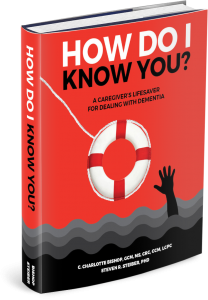 The wait is over – for me, I mean. I have been really excited to share our book, How Do I Know You? A Caregiver’s Lifesaver for Dealing with Dementia. Now, I am going to share a special discount to those of you who have been following my blog, but it’s just for this week. Of course, if you want to pay full price, you can do directly to Amazon:
The wait is over – for me, I mean. I have been really excited to share our book, How Do I Know You? A Caregiver’s Lifesaver for Dealing with Dementia. Now, I am going to share a special discount to those of you who have been following my blog, but it’s just for this week. Of course, if you want to pay full price, you can do directly to Amazon:
https://www.amazon.com/s/ref=nb_sb_noss?url=search-alias%3Daps&field-keywords=c.+charlotte+bishop
But if you would like $10.00 off the Amazon price, I invite you to follow this link: https://www.createspace.com/7325804
Apply the discount code: ZH3VK3U6. I am offering the discount for just this week.
Please let me share one of the case studies from our book. This is a real-life experience from one of the more than 30 Care Managers whom we interviewed to compile 350 case studies. We call this Case Study 1.4:
• Elopement is a home security risk from the inside out
• Dementia is a risk for scams, assault and exposure
• Identify what can still be done safely – independently or with help
The caregiver is the 59 year old daughter, one of six siblings, who are dispersed around the country. Their father, a widower, is an insulin-dependent diabetic, but in good physical health otherwise. The father manifests some frontal lobe dementia, a condition which increases impulsivity, and which has caused him to lose almost a million dollars on women and gambling, the combination of which has placed him at risk for bankruptcy. Enter the professional care manager into what amounted to a five-alarm fire. With a coordinated intervention, the father was placed on a strict budget with his son, a banker, overseeing his bankruptcy proceeding – which is about to be resolved.
While the father is under financial control, he still must be kept in a monitored environment as he is too aggressive with younger women owing to his poor impulse control. He has been successfully moved to assisted living to help mitigate his elopement risk and better manage his blood glucose levels. The father has been “a handful” in the words of the staff, but once trust had been established, he could be cajoled into responding to reasonable demands. His long-term prospects are very favorable.
OUR TAKEAWAY: Helping the father get to a facility and to care that could set appropriate boundaries and protect him from exploitation could not have been possible without proper legal paperwork in place. While guardianship may not be a necessary part of a solution in a case like this, having powers of attorney for both healthcare and finance had been key. The professional care manager extolls the virtues of the staff who could gain the care receiver’s trust, and soon he was relatively easy to redirect – or as she put it, cajole – him into more socially-appropriate behavior.
In the book, we cover what we know about dementia, what can be done to stave off the effects of dementia and most importantly what caregivers can do for their loved ones with dementia and for themselves. We also offer a lot of resources, many of them accessible on-line.
Charlotte Bishop is a Geriatric Care Manager and founder of Creative Care Management, certified professionals who are geriatric advocates, resources, counselors and friends to older adults and their families in metropolitan Chicago.






